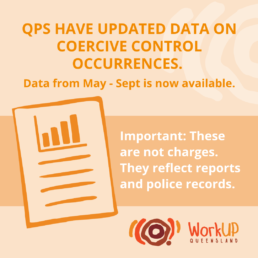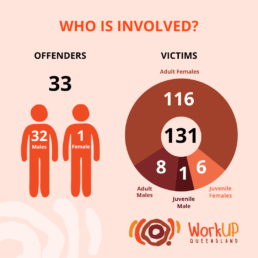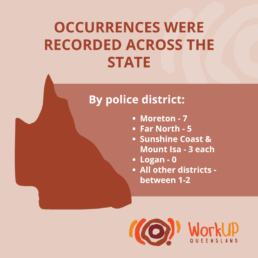Coercive Control
On May 26 2025 Coercive control became a criminal offence in Queensland. We have developed this library of key resources to support you to understand the new legislation and what it means for your practice, and the people you work with.
In brief

It is now illegal to use abusive behaviours to coerce and control people in Queensland.

Adults in domestic relationships including partners, family members and informal carers.

Abusive behaviours that happen more than once, that are used intentionally to control or harm a person and may reasonably be expected to cause harm.

Up to 14 years imprisonment.
Find out more: Coercive control laws | Need to know | Queensland Government
What’s on at WorkUP
Across 2025 and beyond, WorkUP is supporting the sector with a range of professional development opportunities to help you and your team understand and work with the coercive control laws. Check out our Whats on page to find out more.
For example:
- 4-part Coercive Control and Social Entrapment Workshop Series
This series aims to explore and develop our understandings of coercive control and social entrapment and how concepts strengthen our work with victims/survivors, with perpetrators as well as making sense of our role and responsibilities as part of a system that can contribute to safety and manage risk.
21 Oct – 29 Oct, 10am -12pm online workshop
Register now: https://events.humanitix.com/coercive-control-and-social-entrapment-workshop-series-online-october-2025
Responding together: A practitioner roundtable on coercive control legislation
On 17 July, 2025, WorkUP hosted a roundtable with approximately 50 representatives from across our sector and state. The conversations on the day revealed a sector deeply engaged in the complexity of change — calling for collaboration, truth-telling, and victim-survivor-led approaches. Your contributions affirmed the importance of creating space to listen, share, and challenge one another with care and courage.
You can watch the panel discussion here.
Participants at the webinar asked for more information about how QPS would work to implement the new law. We listened and followed up with a supplementary interview with Superintendent Michael Ede. We asked him all your questions and more. You can watch that interview here.
You can access a summary of what happened here: Roundtable RoundUP.
We heard that you were interested in understanding what was happening, including data and stats.
On 29 July, crime victim numbers were published on police.qld.gov.au/maps-and-statistics, including data about coercive control occurrences, number, gender and age (adult or juvenile) of victims identified, number and gender of perpetrators identified (only adults can be prosecuted under the law), as well as the locations of those occurrences. The data is from May and June. It only speaks to occurrences, not charges. To understand more about that distinction, and to unpack the data in more detail watch the interview with Superintendent Ede above. Here is a summary of the data:



More data will become available in the coming months. We will continue to update you as we receive it. Ensure you are subscribed to our newsletter (subscribe in the footer below) connect with us on LinkedIn and join our Facebook group to stay in the loop.
Practitioner tools
Common Risk & Safety Framework
The CRASF framework and accompanying tools have been developed to support a shared understanding and response to domestic and family violence by services and agencies in Queensland.
- The Department of Justice and the Attorney General in 2024, produced a webinar exploring how to appropriately identify and discuss coercive control, documentation and recording, and Queensland’s coercive control legislation. View the webinar here: Coercive Control Webinar
- Access the framework, tools, training and resources via: https://www.justice.qld.gov.au/about-us/services/women-violence-prevention/violence-prevention/service-providers/integrated-service-responses/dfv-common-risk-safety-framework
Other Training Available
Two foundational modules developed by the Queensland government are available online at QCDFVR:
- Module 1: Coercive control and domestic and family violence training (approx. 50 minutes to complete)
- Module 2: Coercive control and the law training (approx. 30 minutes to complete).
Access both courses via https://noviolence.org.au/learn/coercive-control-modules/.
You can also access these resources and more information via the Queensland Government Need to know: Coercive control site.
Central Qld University (CQU) offers a micro-credential course “Understanding the dynamics of Coercive Control”. For a small fee you can access this self-paced, two hour learning module and receive a digital badge and certificate of completion. You do not need to be an existing CQU student to complete this course:
PDC87397 – Understanding the Dynamics of Coercive Control.
You may also be interested in
- Women’s Legal Service Queensland have developed a Coercive Control factsheet, in partnership with the Gold Coast Community Legal Service. You can access the factsheet here: https://wlsq.org.au/resource/coercive-control/
- Reading the short explanatory note which describes the changes to the law and the intentions underlying the changes: https://www.legislation.qld.gov.au/view/pdf/published.exp/sl-2024-0146
- Reading the Criminal Law (Coercive Control and Affirmative Consent) and Other Legislation Amendment Act 2024 in full: https://www.legislation.qld.gov.au/view/pdf/asmade/act-2024-005
- Reading the Coercive Control Communication Framework. Developed in response to recommendations 5 and 8 from the Hear her Voice Report 1, this framework describes the communication strategy to increase community awareness and understanding of the changes to the law: https://www.justice.qld.gov.au/initiatives/end-domestic-family-violence/our-progress/shifting-community-attitudes-behaviours/coercive-control-communication-framework
- Understanding the domestic and family violence (DFV) training and change management framework. The framework guides the alignment of training for staff and organisations working across the DFV and justice service systems toward a consistent, evidence-based, trauma-informed and person-centred response to victim-survivors of DFV and persons who use violence. Access it here: DFV training and change management framework
- Learning more about the background to the May criminalisation of Coercive Control. Listen to a youtube clip Hear her voice – the first report from the Women’s Safety and Justice Taskforce: https://www.youtube.com/watch?v=b5TY58LkZ4Y
Support for victims
Victim Assist Queensland is a government service that supports victims of violent crime—including domestic and family violence—by providing financial assistance, free counselling, court support, and help with victim impact statements, aiming to aid recovery and uphold victims’ rights. https://www.qld.gov.au/law/crime-and-police/victims-and-witnesses-of-crime
Victims may also be able to register to the Corrective Services Victims Register, which may give you access to information about adult offenders. You can find out more here: https://www.qld.gov.au/law/your-rights/victim-rights-and-complaints/victims-registers/adult
The Charter of Victims’ Rights describes the rights of victims interacting with government funded services. You can access the charter and and order copies of the charter via the Office of the Victims’ Commissioner website. https://www.victimscommissioner.qld.gov.au/for-support-services

